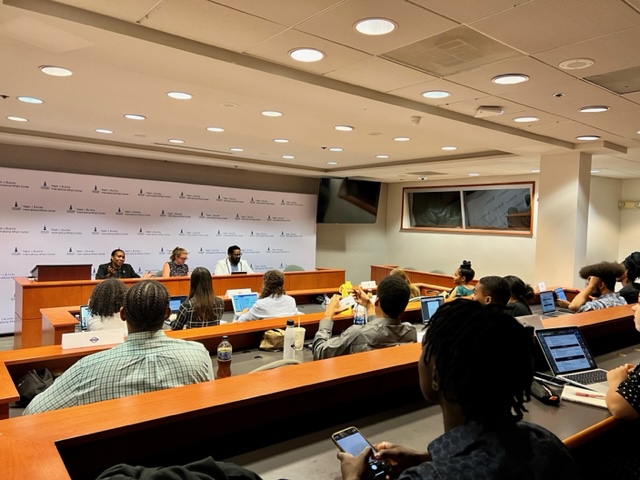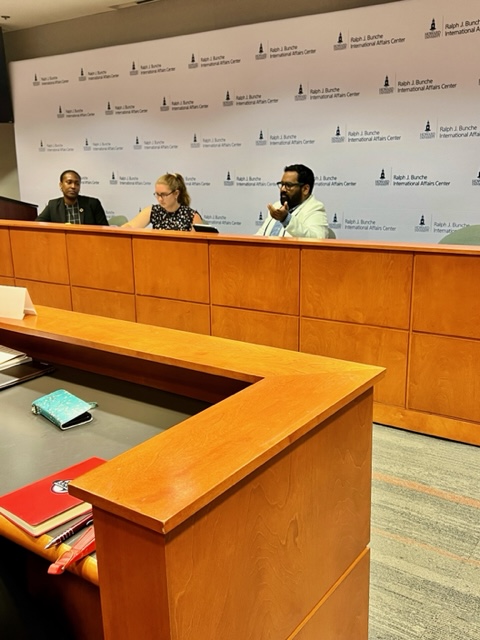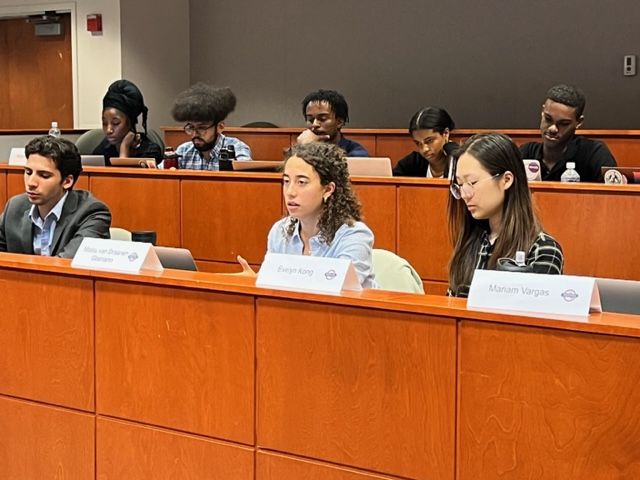Veronica McIntire, Program Coordinator for the Summer Enrichment Program, began the session by briefly introducing each speaker. First was Gabrielle Gueye of Women of Color Advancing Peace, Security, and Conflict Transformation (WCAPS). She then Introduced Sarmat Chowdhury of the United Nations Association of the National Capital Area. Veronica described the panel as having a question-and-answer format. She would later ask a few general questions to the speakers directly and then defer to the Rangel scholars for a more direct Q&A session.
Veronica allowed the speakers to introduce themselves and describe their backgrounds, career paths, and the organizations they work for. Gabrielle began by informing the students about her educational background. Initially considering a career in armed service, she started her studies at West Point before transferring to pursue other career paths. Gabrielle completed her undergraduate degree at Kent State University in Ohio with a concentration in justice studies and teaching English as a foreign language. She later volunteered with the Peace Corps in Ethiopia before returning to the United States to earn her graduate degree from Arizona State University. After graduating, she moved to DC to pursue a career aligned with her interests in international development and business interests. She is currently a mentorship lead at WCAPS.
Sarmat then described his journey, beginning at George Mason University; he told of his lifelong passion for Model United Nations as a backdrop for a storied career in the DMV area working for his alma mater’s Model UN program, Senate Committees, USICH, and more. He then described his work as the Manager of Global Education and Director of GCDC. Sarmat explained that he considers us a “quasi-think tank,” boasting publication, advocacy work, and a paid membership program. He then gave his first advice to the Rangel scholars: get used to the “alphabet soup” of all the acronyms used by DC organizations.
 Once the speakers finished introducing themselves, Veronica asked them her first question: What is the role of your organizations in the international relations career space, and how do they benefit members trying to work in the industry? Gabrielle told the scholars that WCAPS is an organization that helps prepare women of color for careers in DC with the expressed goal of bringing marginalized voices to the table to help make foreign policy decisions. She then listed specific examples of what WCAPS provides members to help their careers, such as job boards and networking events. Gabrielle highlighted the advisory groups in the organization formed around members’ career status. For example, a group of recent graduates may be dedicated to uplifting each other by sharing internship or job opportunities.
Once the speakers finished introducing themselves, Veronica asked them her first question: What is the role of your organizations in the international relations career space, and how do they benefit members trying to work in the industry? Gabrielle told the scholars that WCAPS is an organization that helps prepare women of color for careers in DC with the expressed goal of bringing marginalized voices to the table to help make foreign policy decisions. She then listed specific examples of what WCAPS provides members to help their careers, such as job boards and networking events. Gabrielle highlighted the advisory groups in the organization formed around members’ career status. For example, a group of recent graduates may be dedicated to uplifting each other by sharing internship or job opportunities.
Sarmat then answered the question by telling of some benefits of being a member of UNA-NCA. In addition to hosting many networking opportunities, he talked about a more general sense of community at the organization, allowing members to connect more naturally and develop a rapport over time. Sarmat elaborated that people in the city have long memories, so it is imperative to be cordial and good to work with in order to build a strong reputation. He also discussed a tendency for workers in DC to try and place people into categories based on their interests or specialties. Using himself as an example, he began his career as a specialist on foreign policy in the MENA region and ultimately transitioned to cyber policy.
Lastly, Gabrielle followed up on Sarmat’s response and discussed how organization listservs and email lists are precious tools, even though they may be annoying. She then explained that everyone’s career must begin somewhere. Gabrielle volunteered with WCAPS for two to three years before the non-profit considered her for an opening. She also added that she received a fellowship to publish a paper on decolonization, that opened many doors for her.
Afterward, Veronica asked, “What are some ways you have seen the organizations you have been a part of to empower people?” Sarmat explained that people’s portfolios are essential in signaling what your specialty is and what perspectives you bring to the table. Sarmat was briefly homeless, so his unique perspective helped during his time at the USICH. He then stressed how, in such an intense environment, a place like these organizations in international affairs are examples of places to “pop out” of your workplace mindset and pursue long-term interests, even if they run parallel to your current position. One of the ways he sees his organizations empower people is, again, through networking events. He mentions how at the Society for International Development (SIDs), he used their networking events to identify a networking style that suits him and is conducive to building lasting connections with people.
 Gabrielle echoed Sarmat’s experiences before providing her point of view. She believes that the organizations she and Sarmat are members of are also great places to step up and be a leader—something incredibly valuable in DC. However, your peers in the city are perceptive, so it is essential to be genuine. She then advised on how to network, particularly at happy hours, stating that limiting yourself to one drink is best. Gabrielle took the question as another opportunity to stress the importance of helping your peers in this process to build a more robust network while also being helpful to others. She also spoke more broadly about how one of her organizations, Black Professionals in International Affairs, empowers members by helping them get involved in the IR space of DC.
Gabrielle echoed Sarmat’s experiences before providing her point of view. She believes that the organizations she and Sarmat are members of are also great places to step up and be a leader—something incredibly valuable in DC. However, your peers in the city are perceptive, so it is essential to be genuine. She then advised on how to network, particularly at happy hours, stating that limiting yourself to one drink is best. Gabrielle took the question as another opportunity to stress the importance of helping your peers in this process to build a more robust network while also being helpful to others. She also spoke more broadly about how one of her organizations, Black Professionals in International Affairs, empowers members by helping them get involved in the IR space of DC.
That ended the first portion of the panel. Veronica handed it off to program manager Kristen Shannon, who would command a more informal question-and-answer session where she would call on the Rangel Scholars to ask their questions.
The first student asked how the speakers’ organizations address the retention issues faced by people of color, particularly at institutions critical to international affairs, such as the state department. Gabrielle described how the BPIA and WCAPS are passionate about the subject and engage directly with these places to raise awareness. Sarmat followed up by telling the panel about the UNA-NCA Black Professional Career Fair, which is one of the ways the organization prepares members to confront the problems of racial inequality in the workforce.
Another student then asked about their jobs and relationship with personal flexibility. He was curious if there were any times the speakers felt too stressed and if their organizations helped in any way. Sarmat described all the activities he balanced in high school and college, including academics, work, and model UN. Earlier formative experiences taught him his warning signs of when things were getting to be too much, ultimately saying that balancing work and mental health is always a challenge. For instance, he took a one-week sabbatical from UNA-NCA. While we are a very flexible organization, we know how hard Sarmat works and trust him to manage things like that. Gabrielle highlighted that it is ultimately up to you how much time you want to put into places like WCAPS and UNA-NCA for both volunteers and employees. Protecting your peace and ensuring you are okay is vital.
 Michael Ochoa, a Rangel scholar from Brown University, asked how members can stay involved outside the district. Sarmat explained that UNA-NCA holds many virtual events and virtual options for live events to ensure that people from every circumstance can be involved. He then described how we note when dedicated members attend multiple virtual events to gauge their dedication and involvement. Gabrielle informed us that WCAPS has chapters all over the world strategically placed to include members from everywhere. She also said that members could open their own chapter with enough support.
Michael Ochoa, a Rangel scholar from Brown University, asked how members can stay involved outside the district. Sarmat explained that UNA-NCA holds many virtual events and virtual options for live events to ensure that people from every circumstance can be involved. He then described how we note when dedicated members attend multiple virtual events to gauge their dedication and involvement. Gabrielle informed us that WCAPS has chapters all over the world strategically placed to include members from everywhere. She also said that members could open their own chapter with enough support.
The next question came from Jenna Prunty of Florida State University. She asked if there was any room for spirituality in the industry and, if so, how it influenced organization membership. Gabrielle explained that religion usually isn’t discussed within WCAPS. There are no focus groups on religion at WCAPS, but she said it might be something to look into. On a personal level, she can guarantee that people in the organization will not be treated differently based on their religion.
Sarmat explained that religion’s place in his organizations depends on how comfortable you are being open about it. But when UNA-NCA, SIDs, etc., talk about promoting diversity of thought, they mean it. For him, being a practicing Muslim influences how he handles things like conflict resolution. All in all, religion’s place in these organizations depends mainly on the individual.
The next question was about how members can leverage these organizations to their advantage. Gabrielle talked about how important it is to show up to events. She said to take a targeted approach to the organization to maximize its value and get what you want from it. Sarmat reemphasized how he dislikes networking events and instead focuses on LinkedIn to keep track of everyone he knows and where they are from.
The final question was directed at Gabrielle. The student asked if the BPIA was only for people interested in government careers. She succinctly answered that, while there may be a lean towards government careers based on its location, there is a place for everyone, with members from multiple fields in the organization.
With the final question answered, the session came to a close. Because the scholars were leaving to go somewhere else, a few students each got to chat personally with Sarmat and Gabrielle while waiting for their rides. As an observer, the event was an excellent opportunity to obtain career advice, gain insight into the industry, and do some light networking. More importantly, the students seemed thrilled to be able to ask questions and learn more about where their careers may take them.








